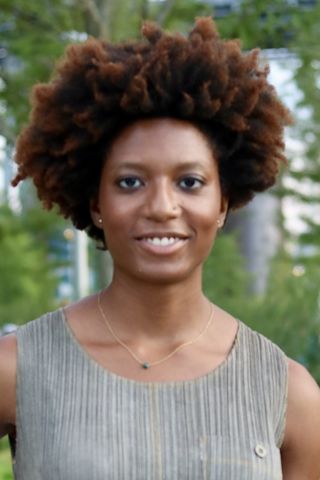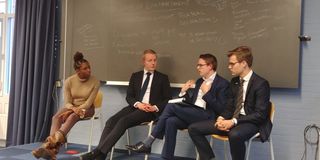Wisdom
Chloé Valdary Disagrees
A "Theory of Enchantment" explores the human condition and the power of choice.
Posted November 9, 2019 Reviewed by Ekua Hagan
What is the purpose of disagreement? For some, it is a way to attack the monsters in our midst. But for Chloé Valdary, disagreement is an opportunity to appreciate human complexity. And she isn't afraid of it.
She has disagreed with those who call for anti-Israel boycotts, sanctions, and divestment (BDS). She has disagreed with those whom she believes don't think about the excesses of capitalism. She has disagreed with the idea (which she sees as pervasive on the political right) that the individual is an island whose well-being is not dependent in part upon a sense of collective belonging. She has disagreed with the concept that “non-racist white people simply don't exist.”
It isn't that Valdary has never encountered racism. As she detailed in an opinion piece for the New York Times, written in 2017 in the aftermath of the violent protests in Charlottesville, “a college anthropology professor assumed I shouldn’t be held to the same standard as my white peers. I’ve been called a 'house slave' for standing up against anti-Semitism. I’ve been called the N-word.” But she sees beyond disagreement to embrace our common humanity.

When columnist Bret Stephens met Valdary, he was immediately impressed. Valdary was awarded an extremely selective summer fellowship at the Wall Street Journal, where Stephens was a foreign affairs columnist and deputy editorial page editor. She was, in Stephens’s words, “such an enterprising and productive thinker and writer” that, for the first time ever, the paper decided to extend the fellowship for a year.
“Chloe has an independent cast of mind and a roving curiosity that leads her to ask probing questions, pursue original lines of inquiry, and reach provocative and often brilliant conclusions,” Stephens told me. “Every time I see her, I walk away with my mind buzzing with new ideas—her ideas.”
He added, “But Chloe is more than this. She’s courageous: She is willing to take unpopular stands when she is convinced they are right. She’s empathetic: Her moral imagination and humane sympathies range wide. And she’s delightful: funny and low-key and a blast to have as a friend.”
The Bartley fellowship at the Wall Street Journal provided Valdary the opportunity to be mentored by Stephens. They “discussed life and philosophy and literature,” she told me, and she learned a tremendous amount from the Pulitzer Prize-winning journalist. “I credit him with giving me the skills and confidence to write more and to write better and to believe in my own talents,” she said.
In their weekly meetings, he helped her structure her 82-page thesis on a method of teaching conflict resolution using anthropology, psychology, science, and pop culture. This would become the catalyst for her psychological wellness and resilience training program for teenagers and adults, Theory of Enchantment.
The full program is a 25-lesson curriculum, but she also leads shorter workshops. In both versions, Valdary incorporates film, music, and literature. She provides skills and techniques for self-care and improved relationships. She teaches empathy, Stoicism, and how to relate to those who have made mistakes “with love and compassion—as if they are redeemable.”

Since developing the program, Valdary has given talks and led workshops in the U.S. and Europe, including Germany and the Netherlands. She has delivered the program in high schools, colleges, and in the corporate world, most recently for the civil rights team at the FAA.
Her classes have been described by graduates as “hitting home” and “revolutionary.” Participants say they come away with more self-awareness, a better understanding of how to avoid overcompensating for their insecurities, and a greater capacity for loving themselves and others.
Aviv Shir-On, who was at the time Israel's ambassador to the Netherlands, found her ideas so useful that he told her he believed they would “help us move in the right direction in defusing conflicts and tensions.”
Many of the principles in Valdary’s program echo wisdom from the Rabbinic tradition. Among them, the exhortation to look up and look down: To experience awe and the feeling astronaut Edgar Mitchell described as “an overwhelming sense of universal connectedness.” To welcome the wisdom that “to everything, there is a season, and a time to every purpose under the heaven.” And to remember gam zeh ya’avor. This, too, shall pass.
“Regardless of your situation,” Valdary says, “you always have the power to choose. This is what distinguishes us as human beings: the power to transcend our instincts. A leopard cannot change his spots, but a human can change his behavior.”
And she adds, “As this is true for you, it is also true for your neighbor.”
Dr. Paresky's opinions are her own and should not be considered official positions of the Foundation for Individual Rights in Education or any other organization with which she is affiliated. Follow her on Twitter @PamelaParesky




